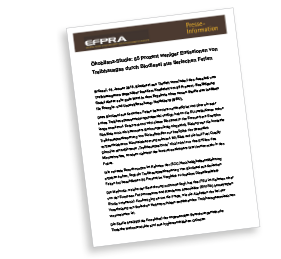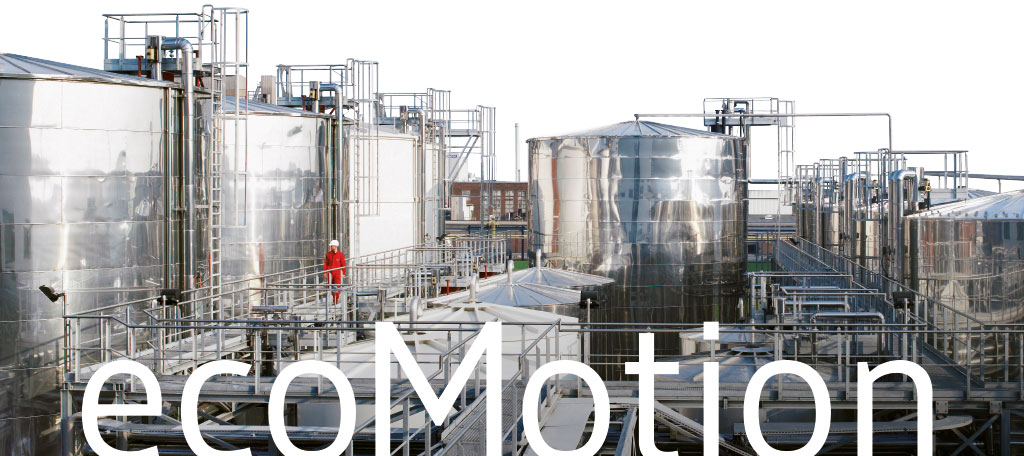The world of the
REMONDIS Lippe Plant
ecoMotion produces a biodiesel at the Lippe Plant that really does deserve its name. No crops are used to make this fuel – only non-recyclable residual material. Residual materials are transformed into fuel. This truly is sustainability in practice.

ecoMotion – a company belonging to the SARIA Group and, therefore, with connections to REMONDIS as well – is leading the way when it comes to producing climate-friendly biodiesel on an industrial scale. Find out more at
ecomotion.de
Proof that biodiesel is better for our climate: press information about the 2015 IFEU study (German)

The first time that fuel was produced from animal fat and old cooking oil at the Lippe Plant was back at the beginning of the 21st Century. At a time, therefore, when biodiesel was not a big issue in Germany. One of the reasons behind this decision was the fact that one of the residual products generated by the rendering plant – namely, animal fat – was a high energy material. But that was not all. Animal fat has another big advantage: the fuel produced from it is much better for our climate than fossil fuels. A number of papers have documented this including a study published in 2015 by the Institute for Energy and Environmental Research (IFEU) in Heidelberg. It shows that greenhouse gas emissions from biodiesel made from animal fat are 85% lower than from fossil fuels. This figure has increased since then and is now estimated to be around 90%.

ecoMotion produces an extremely sustainable and environmentally friendly type of biodiesel from animal fat, waste cooking oil and deep-frying oil
Turning residual waste into something useful is a win-win situation and this is most certainly true for our biodiesel. Fallen farm stock must, by law, be sent for disposal – for example, to prevent the spread of disease. The animal fat generated as a part of this disposal process must also be incinerated. This fat may, therefore, be used to produce electricity in a waste-to-energy plant. However, it can also be used as a fuel in an internal combustion engine – a far more sustainable use of this material. ecoMotion makes the very most of a residual material, therefore, turning an obligation into something really useful. Find out more about the disposal of high risk animal by-products
The production of biodiesel generates zero waste, i.e. 100% of the input material is able to be put to good use. By-products resulting from this process, such as glycerine, are used by the REMONDIS Group itself or by external companies for their industrial processes. Producing biodiesel from animal fat and old cooking oil is quite a bit more complicated than standard biodiesel production systems using rapeseed or palm oil. This is because it needs two additional stages: pre-esterification and distillation. The following graphic explains the process in more detail.
The quality of our biodiesel is certified by UCL
Producing diesel made from animal and vegetable residual materials – that certainly doesn’t sound as if it’s an aesthetically pleasing business. The reality though is really very different. Practically all of the visitors to the facility are surprised by just how clean the diesel production plant actually is. Not a speck of dirt to be seen; instead a great deal of stainless steel and clean production halls. What’s more, our output material is just as fascinating to look at. Biodiesel is an extremely pure, crystal clear product – as clear as water.

Cutting emissions by 488,000 tonnes every year, the Lippe Plant has an excellent environmental performance – and our biodiesel production operations are one of the main reasons for these results. The environmentally friendly fuel produced here not only reduces emissions of CO2 but also of carbon monoxide, hydrocarbons and soot. This is important as it is the latter that cause the most damage to the climate alongside carbon dioxide.

The volume of CO2 emissions saved by using ecoMotion’s Lippe Plant biodiesel every year = the amount of emissions produced by 160 articulated lorries run on normal diesel over the same period

Diese Seite verwendet aktuelle Techniken, die in dem von Ihnen verwendeten Browser unter Umständen nicht korrekt
angezeigt werden können.
Bitte aktualisieren Sie Ihren Internet-Explorer oder weichen auf einen anderen Browser wie Chrome oder
Firefox aus.
Schließen